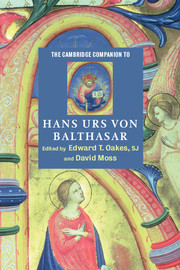Book contents
15 - Balthasar’s literary criticism
from Part III - Disciplines
Published online by Cambridge University Press: 28 May 2006
Summary
ART AS RELATIVE SINGULARITY
Hans Urs von Balthasar liked to claim from time to time that he was really a Germanist rather than a theologian. As peculiar as that claim might sound to those who know him from his great theological trilogy, his patristic monographs, or even his work in the 1980s on the Vatican's International Theological Commission, his assertion certainly holds true of his professional training before he entered the Society of Jesus in 1929, when he was awarded a doctorate in Germanistik at the University of Zurich. But it is not as if his entrance in the Jesuit Order then meant he had abandoned literary studies for 'pure' theology. Indeed, it will be the burden of this chapter to show that his later work as a theologian is thoroughly intertwined with his earlier work in literary appreciation, criticism, and theory. Some might even argue that Balthasar's theology is so enmeshed with his literary sensibility that it undermines, confuses, or even vitiates that theology. The astute scholar, however, will find that the richness of Balthasar's theology is due, at least in part, to his literary training and sensibility, and that, conversely, his theology only lends weight and substance to his literary-critical insights, making those insights genuinely interdisciplinary, and in that way all the more original.
- Type
- Chapter
- Information
- The Cambridge Companion to Hans Urs von Balthasar , pp. 207 - 223Publisher: Cambridge University PressPrint publication year: 2004

